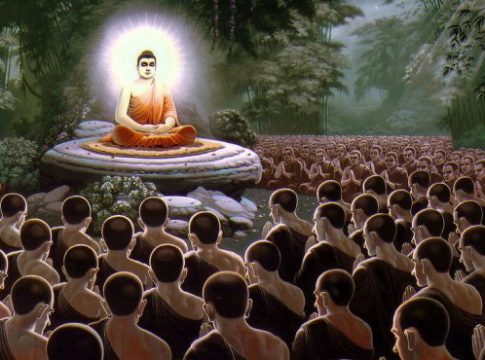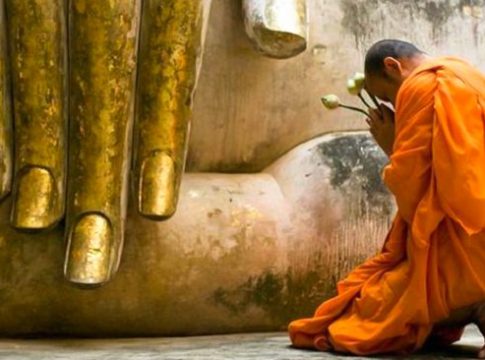The Meaning and Benefits of Repentance
By Tam Hoa - 07/04/2020
In Buddhism, repentance is not akin to the concept of “washing away sins” as understood in some other religions. Instead, it is a courageous act of recognizing one’s own mistakes in order to correct them. Buddhism does not teach the existence of a deity who can absolve or condemn sins; rather, repentance is a method of self-reflection and self-improvement.
The Concept of Repentance
The Buddha often praised, “In life, there are two types of people worthy of admiration: the first is the person without faults, and the second is the one who acknowledges their faults and repents”. He asserted firmly, “As long as beings are caught in the cycles of the three realms and the six paths of existence, none are entirely pure, and no one is without sin”. All beings, in their daily lives, make mistakes—whether unintentionally or deliberately. A true Buddhist is one who dares to recognize their own transgressions.
Repentance means feeling remorse and shame for the wrongs one has committed and vowing never to repeat them. In other words, repentance is “to regret and renounce”, which is the essence of this practice.
In Buddhism, repentance is not about absolution by a deity or priest but about the bold acknowledgment of one’s faults and the commitment to self-correction. This process allows Buddhists to elevate themselves spiritually and advance on the path of cultivating virtues and achieving enlightenment. It serves as a transformative practice that refines the “three karmas” (actions of body, speech, and mind) and aids individuals in progressing from the status of ordinary beings toward Buddhahood.
What is Repentance?
Definition:
In Sanskrit, repentance is called Samma. In Chinese, it is translated as “repenting of past errors”. Buddhist scriptures explain:
“Repentance means to regret one’s past misdeeds.
Renunciation means to abandon future wrongdoings.”
Within Buddhism, when one’s body acts improperly, one’s speech lacks care, or one’s mind entertains harmful thoughts, repentance involves openly acknowledging these errors and sincerely vowing not to repeat them.
If repentance becomes a cycle of committing wrongs and seeking forgiveness repeatedly, it loses its meaning and deviates from the Buddha’s teachings. True repentance requires sincerity, awareness, and a determination to change.
Methods of Repentance
Buddhism teaches that all errors originate in the mind; therefore, repentance must also come from a sincere transformation of the mind. Recognizing this, Buddhist masters have developed various methods of repentance, incorporating both practical actions and contemplative understanding.
A common repentance verse recited by Buddhists reflects this understanding:
All my ancient twisted karma
From beginningless greed, hate and delusion
Born through body, speech, and mind
I now fully avow.
While there are many forms of repentance, it is essential for each Buddhist to choose a method suitable to their capacity, ensuring they understand the meaning behind the practice for it to be truly effective.
Practical Forms of Repentance:
Formal Repentance Rituals: Establish a ceremonial altar and invite monastics to bear witness. The individual confesses their wrongdoings with sincerity and vows not to repeat them.
Prostration Repentance: The practitioner prays and performs prostrations before the Buddha and Bodhisattvas for a designated period (e.g., 1, 7, or 49 days). This continues until they perceive auspicious signs, such as visions of the Buddha or lotus flowers.
Repentance through Recitation of Sacred Names: This practice was compiled by Master Bat Đong during the Tong Dynasty. It involves reciting the names of 53 Buddhas from the Fifty-Three Buddhas Sutra and 35 Buddhas from the Medicine King and Superior Medicine Sutra. This is the most common repentance practice in Vietnamese Buddhist temples.
Contemplative Forms of Repentance:
Repentance of Non-Arising Mind: This method draws from the Diamond Sutra: "The past mind cannot be grasped, the present mind cannot be grasped, and the future mind cannot be grasped". Practitioners contemplate that sins originate in the mind and can also be extinguished by the mind through awareness and transformation.
Repentance of Non-Arising Phenomena: This involves realizing the ultimate truth that all phenomena are without intrinsic birth or cessation. Practitioners contemplate the nature of true mind, Buddha-nature, and the Dharma-body, which transcends all dualistic notions of creation and destruction.
These methods are suited for individuals with advanced spiritual capacities. By realizing the non-arising nature of the mind and phenomena, one eradicates the roots of all karmic afflictions.
While there are diverse ways to practice repentance, each Buddhist should select a method that aligns with their personal capacity and understanding. The practice must be meaningful—reading or chanting mechanically without understanding its significance provides no real benefit.
Unfortunately, this mechanical approach is a common issue in contemporary Buddhist practice. True repentance requires deep reflection, understanding, and a heartfelt resolve to transform oneself.
The Benefits of Repentance
A Buddhist who sincerely repents and corrects their mistakes will experience tangible benefits in the present and future. The Buddha taught in the Dīrgha Āgama:
“Those who correct their faults progress on the path of the Tathāgata’s teachings”.
He also affirmed in the Forty-Two Chapters Sutra:
“A person who fails to amend their faults will see those faults accumulate and weigh upon them, like water flowing into the sea”.
Key benefits:
Individuals develop mindfulness and a firm resolve, preventing future errors.
A person’s moral qualities improve, and virtuous actions increase, as they refrain from creating negative karma.
One’s mind becomes lighter, free from worry and regret.
By sincerely practicing repentance, individuals cultivate a virtuous life, transforming their karma and advancing on the spiritual path.
Compiled by Dieu Duc
!["[KTMH] Trailer | WHAT TO DO TO MAKE SUMMER HOLIDAYS MORE MEANINGFUL?"](https://i3.ytimg.com/vi/s0VUGa1v6uw/maxresdefault.jpg)
.jpg)


